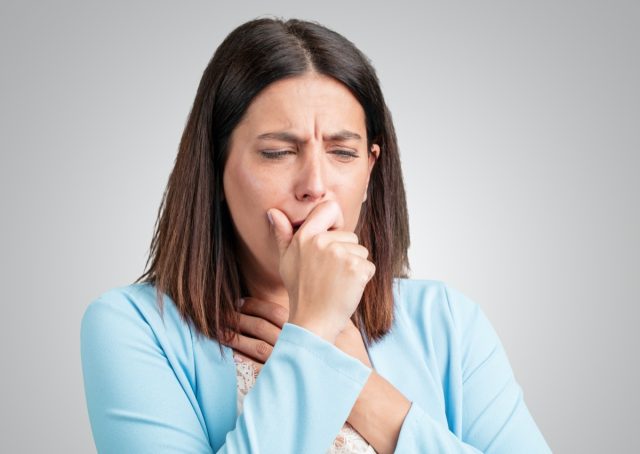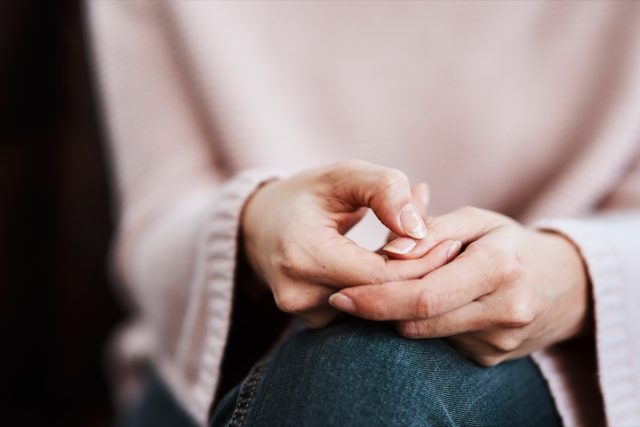Public acceptance of marijuana is a world away from the Reefer Madness days—19 states have legalized recreational cannabis, and more seem ready to follow suit. Although science indicates that marijuana poses fewer health risks than alcohol, tobacco, and illicit drugs, that doesn’t mean pot is entirely harmless. In fact, in recent years, studies have spotlighted some risks of marijuana use that aren’t often publicized. You’ll want to be aware of them, particularly if you have certain health conditions. Read on to find out more—and to ensure your health and the health of others, don’t miss these Sure Signs You’ve Already Had COVID.
Some heavy marijuana users experience severe queasiness, vomiting, and stomach pain. It’s called cannabinoid hyperemesis syndrome, or CHS. Experts estimate 2.7 million Americans experience the condition, which is frequently misdiagnosed. (Last year, it was the subject of a “Medical Mysteries” column in the Washington Post.) “CHS went from being something we didn’t know about and never talked about to a very common problem over the last five years,” Dr. Eric Lavonas, a spokesman for the American College of Emergency Physicians, told the New York Times.

According to a 2020 study on acute reactions to cannabis published in the Journal of Marijuana Research, 50% of regular marijuana users reported having coughing fits while using the drug. “When you get any other kind of medication, there will be a leaflet or a warning printed on the bottle about the drug’s potential side effects,” said the study’s lead author. “There really isn’t very much out there on this for cannabis, and we think that it is important for people to have access to this kind of information.”
RELATED: 5 Ways to Prevent Aging, Says Dr. Sanjay Gupta

A 2019 study published in The Lancet Psychiatry found that daily marijuana users were three times as likely to experience psychosis—losing touch with reality—than non-users. Several previous studies have associated marijuana use with anxiety and depression. “Marijuana should be used with caution if you have a mental health condition,” warns the Mayo Clinic. “Marijuana use might worsen manic symptoms in people who have bipolar disorder. If used frequently, marijuana might increase the risk of depression or worsen depression symptoms.”

A recent study conducted by the Proceedings of the National Academy of Sciences found that children of women who use cannabis during pregnancy have a greater risk for developmental and behavioral issues. “Maternal cannabis use is associated with increased cortisol, anxiety, aggression, and hyperactivity in young children,” the study’s authors wrote. “This corresponded with widespread reductions in immune-related gene expression in the placenta which correlated with anxiety and hyperactivity.”
RELATED: The #1 Causes of Bad Health After 50, Says Science

A 2017 study found that marijuana users 50 to 64 years old were more likely to participate in risky activities—including impaired driving, stealing, and physical violence—compared to older nonusers. Other studies have found that marijuana users 65 years or older were more likely to drive under the influence compared to older adults who don’t use pot.

A 2021 study conducted at the University of Queensland in Australia found that compared to non-users, regular marijuana users were more likely to engage in high-risk alcohol consumption, smoke tobacco, use illicit drugs, not be in a relationship at age 35, suffer depression and not have a paying job. “Public health agencies and policymakers need to deliver a clear and strong message to the public that regular cannabis use is harmful, regardless of when an individual initiates its use,” the study’s lead author said. And to get through this pandemic at your healthiest, don’t miss these 35 Places You’re Most Likely to Catch COVID.

 The Best Legal Delta 9 Near You in Park Forest North
The Best Legal Delta 9 Near You in Park Forest North 
Be the first to comment